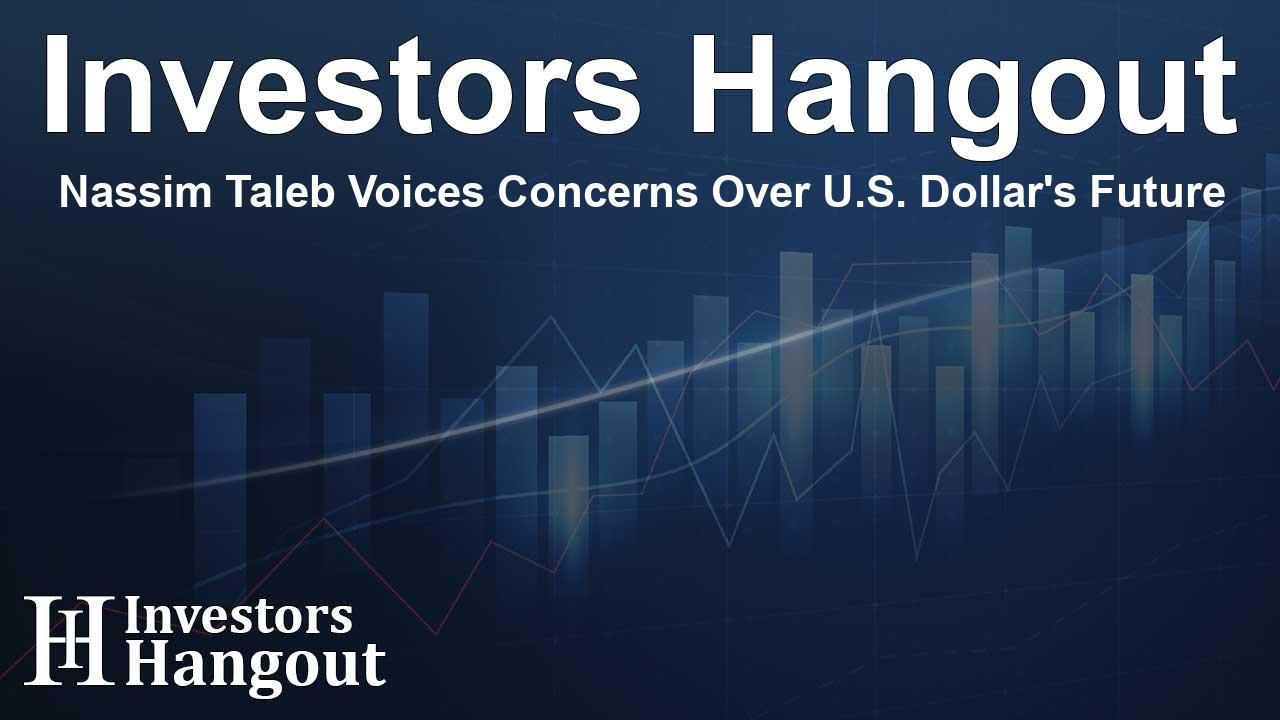Nassim Taleb Voices Concerns Over U.S. Dollar's Future

Understanding Taleb's Concerns About the U.S. Dollar
Nassim Taleb, renowned for his influential work, The Black Swan, has recently raised alarms regarding the future of the U.S. dollar in global finance. His concerns are rooted in the aftermath of actions taken against Russian assets following geopolitical tensions. This situation has ignited a dialogue on the implications of such drastic measures on foreign investments and currency stability.
The Role of Sanctions in Financial Systems
Taleb describes the freezing of assets as a significant financial blunder, suggesting it may deter foreign entities from investing in U.S. currency due to fears of arbitrary confiscation. Observing from his analyst vantage point, he acknowledges sanctions might seem justified from a legal perspective, but he asserts that they fundamentally undermine the integrity of international trade.
The Dominance of the Dollar
Despite its current dominance as a global payment method—accounting for about 88% of foreign exchange transactions—the dollar's status as the premier reserve currency is waning. Historical data reveals a decline from representing 71% of reserves in 2000 to just 58% today. This erosion of confidence has driven nations to seek alternatives, notably gold, as they diversify their reserves away from the dollar.
Implications of De-dollarization
Taleb's fears amplify as he elaborates on the ongoing trend of de-dollarization, where countries increasingly refrain from using the dollar as their primary currency for storage and transactions. He highlights that the perception of safety surrounding dollar-denominated assets is crucial for attracting investment and maintaining market confidence. With escalating national debt and rising interest expenses, the Treasury Department is compelled to issue more bonds, many acquired by foreign investors. The pivotal question arises: will these investors continue financing U.S. debt amidst growing uncertainties?
Market Fragility in Contemporary Economics
Taleb's apprehensions extend beyond currency, as he also addresses market fragility. He contends that the current environment is more unstable than any time in the last 20-30 years. While advancements in technology and the surging interest in artificial intelligence have propelled market optimism, he warns that the very companies leading this charge may not necessarily represent sustainable growth prospects.
Complacency and Risk
Drawing parallels to past market collapses, Taleb points to the complacency permeating today’s investment atmosphere. He believes that the previous era of low interest rates has conditioned many investors to overlook conservative strategies, leading to inflated valuations driven by speculative hope rather than solid fundamentals. The mixed economic signals on the horizon further complicate the situation, painting a confusing picture of future prospects.
Looking Ahead: What Lies Beyond?
As the conversation on the U.S. dollar and market health continues, Taleb's colleague has also echoed similar concerns, indicating that the recent shift in the yield curve serves as a precursor to potential upheavals in the market landscape. The prospect of navigating 'black swan' events, or unpredictable occurrences with severe consequences, looms larger than ever.
Final Thoughts
In conclusion, Taleb attributes grave implications to the current administration's actions regarding asset confiscation and the broader consequences for the U.S. economy. His insights drive home the importance of fostering a stable investment environment that encourages trust in the currency and by extension, the financial system at large. As these discussions unfold, it becomes evident that vigilance and adaptability are paramount in navigating the uncertain waters of global finance.
Frequently Asked Questions
What prompted Nassim Taleb's concerns about the U.S. dollar?
Taleb's concerns stem from the freezing of Russian assets due to sanctions, which he believes undermine trust in the U.S. dollar.
How has the dollar's status as a reserve currency changed?
The dollar's share of global reserves has decreased from 71% in 2000 to 58% currently, promoting a trend toward de-dollarization.
What alternatives are countries considering as they diversify?
Many nations are increasingly turning to gold and other assets as safe havens, looking to mitigate exposure to dollar fluctuations.
Why does Taleb think markets are fragile now?
Taleb believes the current economic environment is distorted by inflated valuations and complacency among investors, raising the risk of significant market corrections.
What might signify trouble ahead for the U.S. economy?
Taleb warns that shifts in the yield curve could indicate an impending recession, while market dynamics suggest a shift towards unpredictable outcomes.
About Investors Hangout
Investors Hangout is a leading online stock forum for financial discussion and learning, offering a wide range of free tools and resources. It draws in traders of all levels, who exchange market knowledge, investigate trading tactics, and keep an eye on industry developments in real time. Featuring financial articles, stock message boards, quotes, charts, company profiles, and live news updates. Through cooperative learning and a wealth of informational resources, it helps users from novices creating their first portfolios to experts honing their techniques. Join Investors Hangout today: https://investorshangout.com/
Disclaimer: The content of this article is solely for general informational purposes only; it does not represent legal, financial, or investment advice. Investors Hangout does not offer financial advice; the author is not a licensed financial advisor. Consult a qualified advisor before making any financial or investment decisions based on this article. The author's interpretation of publicly available data shapes the opinions presented here; as a result, they should not be taken as advice to purchase, sell, or hold any securities mentioned or any other investments. The author does not guarantee the accuracy, completeness, or timeliness of any material, providing it "as is." Information and market conditions may change; past performance is not indicative of future outcomes. If any of the material offered here is inaccurate, please contact us for corrections.